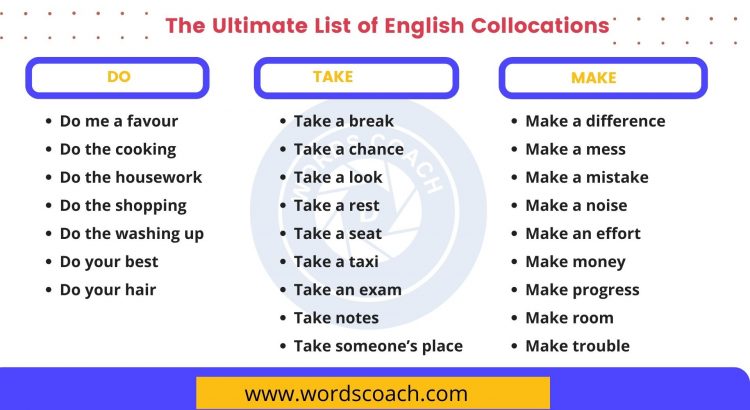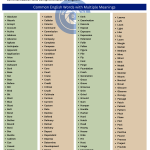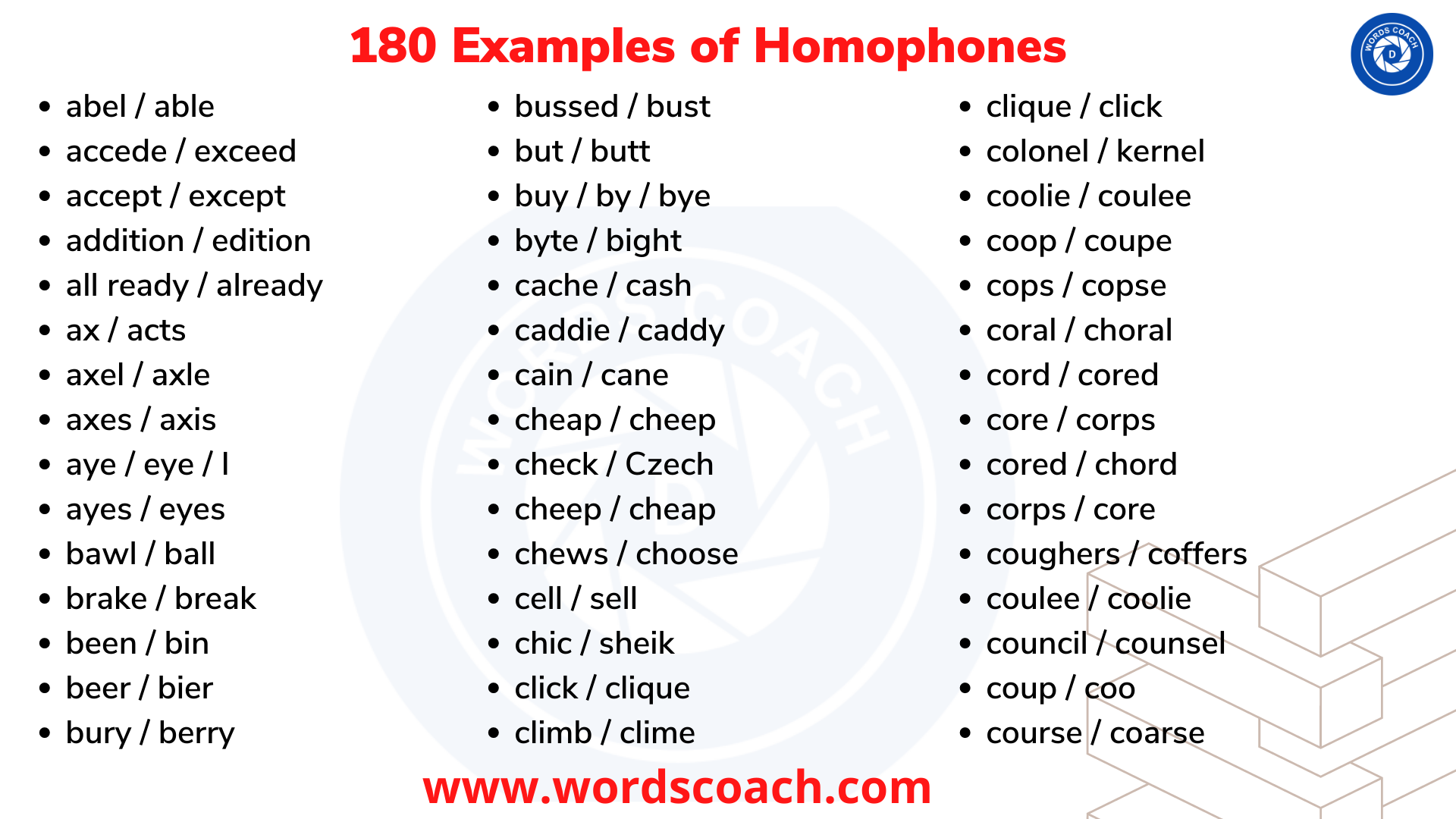Common Collocations Starting with Verbs
A collocation is two or more words that often go together. These combinations just sound “right” to native English speakers, who use them all the time.
Collocations with the Verb DO
- Do me a favour
- Do the cooking
- Do the housework
- Do the shopping
- Do the washing up
- Do your best
- Do your hair
Read More: 45+ Collocations with DO in English
Collocations with the Verb TAKE
- Take a break
- Take a chance
- Take a look
- Take a rest
- Take a seat
- Take a taxi
- Take an exam
- Take notes
- Take someone’s place
Collocations with the Verb MAKE
- Make a difference
- Make a mess
- Make a mistake
- Make a noise
- Make an effort
- Make money
- Make progress
- Make room
- Make trouble
Read More: Collocations with MAKE in English
Collocations with the Verb HAVE
- Have a good time
- Have a bath
- Have a drink
- Have a haircut
- Have a holiday
- Have a problem
- Have a relationship
- Have lunch
- Have sympathy
Read More: Collocations with the Verb HAVE
Collocations with the Verb CATCH
- Catch the bus
- Catch a ball
- Catch a cold
- Catch a thief
- Catch fire
- Catch sight of
- Catch someone’s attention
- Catch someone’s eye
- Catch the flu
Collocations with the Verb BREAK
- Break the law
- Break a leg
- Break a promise
- Break a record
- Break someone’s heart
- Break the ice
- Break the news to someone
- Break the rules
Collocations with the Verb KEEP
- Keep the change
- Keep a promise
- Keep a secret
- Keep an appointment
- Keep calm
- Keep in touch
- Keep quiet
- Keep someone’s place
Collocations with PAY
- Pay respect
- Pay a fine
- Pay attention
- Pay by credit card
- Pay cash
- Pay interest
- Pay someone a visit
- Pay the bill
- Pay the price
Collocations with the Verb SAVE
- Save yourself the trouble
- Save electricity
- Save energy
- Save money
- Save someone a seat
- Save someone’s life
- Save something to a disk
- Save time
Collocations Related to Business
- Annual turnover
- Keep in mind
- Break off negotiations
- Close a deal
- Close a meeting
- Come to the point
- Dismiss an offer
- Draw a conclusion
- Draw your attention to
- Launch a new product
- Go bankrupt
- Go into partnership
- Make a profit/loss
Collocations with the Verb COME
- Come under attack
- Come close
- Come direct
- Come early
- Come first
- Come into view
- Come last
- Come late
- Come on time
- Come prepared
- Come right back
- Come to a decision
- Come to an agreement
- Come to an end
- Come to a standstill
- Come to terms with
- Come to a total of
Collocations with the Verb GET
- Get the sack
- Get a life
- Get a job
- Get a shock
- Get angry
- Get divorced
- Get drunk
- Get frightened
- Get home
- Get lost
- Get married
- Get permission
- Get ready
- Get started
- Get the impression
- Get upset
- Get wet
- Get worried
Collocations with the Verb GO
- Go bald
- Go abroad
- Go astray
- Go bad
- Go bankrupt
- Go blind
- Go crazy
- Go fishing
- Go mad
- Go missing
- Go online
- Go out of business
- Go overseas
- Go quiet
- Go sailing
- Go to war
Read More: Important Collocations with GO in English
Collocations Related to TIME
- Bang on time
- Dead on time
- Free time
- Great deal of time
- Make time for
- Right on time
- Run out of time
- Time goes by
- Time passes
- Waste time
- Spend time
- Waste time
- Make time for
- Save time
- Free time
- Have a hard time
- Have time
- Take your time
- On time
- Just in time
- Take time off
- Run out of time
- Stall for time
- Pass the time
- Leisure time
- Spare time
- Take your time
- This/the same time tomorrow
- To tell time
- To keep time
- Precious time
- Set time
- Kill time
- Have a great time
Read More.
| Compound Words | 50+ Common Grammar Mistakes in English |
| Slang Words | Slang Dictionary | 50+ Sentences with HAS |





